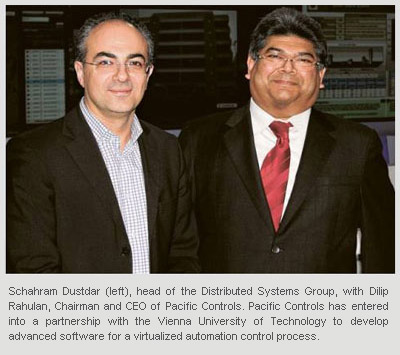
Press Releases
PACIFIC CONTROLS BUILDS $85M DATA CENTER
Dubai complex for building automation, due to be ready in July, will be the largest of its kind in the Middle East

Dubai, Jan 13, 2011: Building automation solutions provider Pacific Controls, with its headquarters in Dubai's Techno-park, is currently working on building the largest Data Center in the Middle East with an investment of $85 million (Dh312.15 million), the company's chairman and CEO Dilip Rahulan told Gulf News in an interview yesterday.
The Data Center is to be designed as a cloud computing site spanning over 60,000 square feet of office space to be ready in July, where Pacific Controls said it would concentrate its managed data services for building control and automation, Rahulan said.
The new centre is to be part of the expansion drive the company is currently undertaking. Pacific Controls said the company was planning 24 command centres globally by the third quarter of 2013 at an overall investment of $250 million.
Currently, there are five centres: in Dubai, London, Singapore, New York and Sydney. Pacific Controls describes itself as one of the leading providers of building automation, with a system based on software and network controls.
The main operating hub is Dubai, where Pacific Controls currently has 24,000 buildings connected to its own control network, supervising emergency, power, cooling and energy, elevators and other mechanical and electrical infrastructure in those buildings.
It is also working closely with Dubai's civil defence department, providing "city management" for the authorities, meaning that Pacific Controls traces and handles alarms in private and public buildings on behalf of the authority.
Rahulin said his aim was to connect 60,000 buildings in Dubai to the company's automation management service network.
Pacific Controls was working closely together with etisalat, using it data network and wireless services, a company spokesman said.
To enhance its expertise in building automation management, a Pacific Controls spokesman said the firm had now entered a partnership with the Vienna University of Technology to develop advanced software for a virtualized automation control process.
Intelligent controls
Rahulin said that the specialists in Vienna were working on developing "robots" for the software system — intelligent controls that respond to alarm and maintenance messages without human intervention, making the building control process even easier and faster.
Pacific Controls' Viennese team also concentrates on "cloud computing" solutions, said Schahram Dustdar, head of the Distributed Systems Group at the Vienna University of Technology.
Three people in Vienna were creating the new software solutions, which were then to be developed at the Pacific Control software centre in Trivandrum, India. One major focus of the company's building automation system was energy control, an important part in managing a building's energy consumption in regions like the Middle East and eventually lower the running costs, a company spokesman said.
"There is a huge potential for energy control systems here," said Rahulan. Pacific Controls' advanced software operation could help to reduce a building's energy costs by up to 50 per cent, he added.
"This can all be done with no physical changes to the infrastructure, just based on data analysis and by designing and adjusting parametres," he said.
For example, a hotel complex like the Atlantis at Palm Jumeirah accumulated energy costs of $40 million annually, a sum where energy control made great sense. "An average high rise in Dubai has annual power costs of about $2 million," Rahulan said.
"Our system allows to set new benchmarks to bring the costs down."
Energy demand
A presentation at the Pacific Controls command centre in Dubai shows that the software is capable of calculating energy demand based on the current weather, the direction of the wind, the amount of clouds and intensity of sunlight.
"I would not call this a ‘green' approach, but it is environmentally and technologically smart and highly energy efficient," Rahulan said.
He said the company also cooperated with Masdar and has several industrial clients in the UAE such as Adnoc, Eppco, oil and pipeline companies, Dubai Airport's Terminal 3, Dubai World Central and a number of property development companies.
It was also running a pilot project with Dewa and managing the Burj Khalifa's fire alarm system.
Other cooperations are with the King Abdullah University of Science and Technology in Saudi Arabia, and providers such as France Telecom and Sprint.
In the US, Pacific Controls cooperates with the Homeland Security agency and several property firms.
The company - with a total of 1,800 staff - is owned by three people, including Dilip Rahulan.
Funding for the expansion comes partly from cooperating telecom providers and financial institutions. Rahulan said 2010 revenue was around $100 million, and this year's target would be $150 million.
